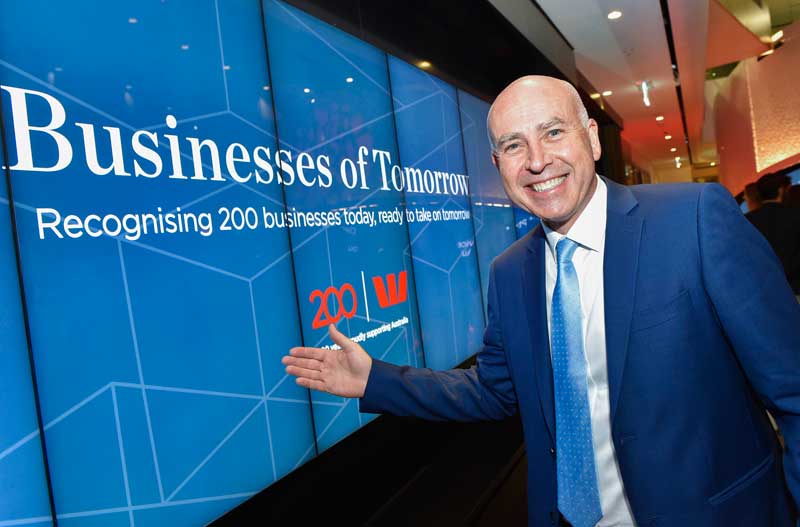This content is produced by The Australian Financial Review in commercial partnership with Westpac.
Sometimes, a business opportunity comes out of seeing something, and asking a question. For “eco-industrialist” David Hodge, it was repeatedly seeing piles of agricultural plastic on farms, and asking, “What happens to that?
“Some of the farmers would bury it, and some would burn it. Very little of it is recycled, because of high contamination. When I looked into it, I was staggered to find that 5000 tonnes of plastic film is used by the agricultural and food industries in Australia, but only about 4 per cent of it is recycled – the same proportion as globally. The food residues, ink or other contaminants make it impossible to recycle. It’s either burned or goes into landfill – neither of which solves the problem,” says Hodge.
Having already built and operated a business that invented a packaging product made out of plasterboard waste, Hodge’s interest was piqued. “We’d developed a process for plasterboard, we had a patented process that we built into an engineering business, and an end-product. We’re eco-industrialists – we look at environmental problems, we ask a lot of questions, and we bring to bear a whole heap of engineering expertise.
“We’re not from the plastics industry, we’re not from the recycling industry, we just look at a problem and look across a range of industries, and ask, ‘Is there anything else that another industry has that has solved a similar problem, and if so, how can we apply it?'” he says.
The result was Hodge’s company, Plastic Forests, which was formed in 2010 to develop a world-first innovative method to recycle contaminated plastic film without using water, and its consumer brand, Green Mongrel: one of the end-products of Plastic Forests’ film recycling process is Green Mongrel water-proof, long-life garden edging.
But long before Green Mongrel, there was the problem – and the process.
“The problem, and it’s a global one, is all of the used film and bags in the food and agricultural industry, from the silage – green fodder – films, the blood-soaked chicken and beef films, to the wraps that have been in contact with meat and fish and other foods, the food processing bags, the bread bags,” says Hodge.
When he and his team started looking at the plastic films, they found that existing film recycling processes relied on water for cleaning – but it took up to six litres of water to clean one kilogram of film. “We realised that only created another problem waste stream, and also, water supplies are under enough pressure as it is, around the world. We asked, ‘Could a dry-cleaning process work?”‘
Four years of R&D later, Plastic Forests had a process that could work. From there it took another four years to scale that up to an industrial scale. “We had to take a highly contaminated product that had a negative value, and we had to create a value. We dry-clean the films and bags, shred them, and create resin. That process creates value, in a commodity product we can sell.
“There are two ways we can go with that – wholesale or retail. We make underground electric cable covers, we turn 180,000 bread bags a week from Tip Top into resin that another company turns into builders’ film, but we also wanted a branded consumer company, which is where Green Mongrel comes in,” says Hodge.
Access to Silicon Valley expertise
Awarded the title of Most Innovative Manufacturing Company in Australia in 2015, Plastic Forests’ industrial scale dry-cleaning capability is attracting the interest of international organisations including the United Nations.
Last year, Hodge saw a banner on the Westpac website for the Businesses of Tomorrow program. “It captured my imagination,” he says. “It took two weeks of man-hours to put in the application properly, we thought about it quite deeply, we searched within ourselves –are we a business with a purpose, a cause, a meaning; are we solving a problem; do we have a value proposition for customers – and I suppose our thoughts very much aligned with what they were looking for.”
Fast-forward to August 2017, and Hodge was pinching himself, as one of the 20 top winners of the Businesses of Tomorrow program, in places such as Silicon Valley and Shanghai, visiting the operations of, and speaking to the founders of, firms of the calibre and global scale of Uber, Airbnb, LinkedIn and Alibaba.
“The value of the program has been fantastic, in three key ways,” he says. “First, the educational and business inputs from the global study tour, sitting down with the founders of some of these companies – that is just amazing, you can’t buy that. Relating that to your own business is incredibly inspiring.”
The second point was the immersion with the other Businesses of Tomorrow winners. “On that two-week trip, from 6am to 10pm, on the bus or waiting in airports, you’re sitting down with people in different industries and hearing about their journeys and struggles. It’s being able to seek, and offer, advice. Even today, we’re in a What’s App group, there are conversations every week. Does anyone know this? I need help with that? Then you see the flurry of answers come.”
Lastly, there is the professional services component. “That is very real, and meaningful, and it’s just so generous of Westpac,” says Hodge. But the benefits of the Businesses of Tomorrow program don’t end there.
“Even completing the application for the program is a great benefit. There’s a massive focus in the selection criteria on why do you exist – what problems are you solving – what contribution does your business make, either locally or to the world? It forces you to sit down and soul-search your business. If you put in the effort to do that, you might not win, but the process will make you better,” says Hodge.

